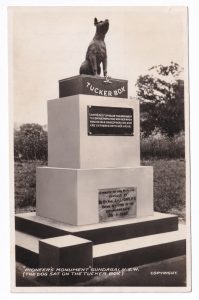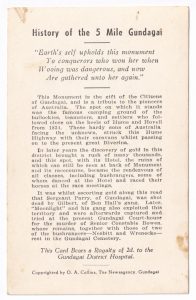[Editor: This postcard (unused), which incorporates a photo of the Pioneer Monument (Gundagai, NSW), including a statue of the dog on the tucker box, is believed to be from the 1940s. The postcard is undated.]
[Front of postcard]
“Pioneer’s Monument” Gundagai, N.S.W.
(The dog sat on the tucker box)
Copyright.
[Description: A photo of the statue of the dog on the tucker box (Gundagai).]
[Reverse of postcard]
History of the 5 Mile Gundagai
“Earth’s self upholds this monument
To conquerors who won her when
Wooing was dangerous, and now
Are gathered unto her again.”
This Monument is the gift of the Citizens of Gundagai, and is a tribute to the pioneers of Australia. The spot on which it stands was the famous camping ground of the bullockies, teamsters, and settlers who followed close on the heels of Hume and Hovell from 1824. These hardy sons of Australia facing the unknown, struck this Hume Highway with their caravans whilst passing on to the present great Riverina.
In later years the discovery of gold in this district brought a rush of many thousands, and this spot, with its Hotel, the ruins of which can still be seen at back of Monument and its racecourse, became the rendezvous of all classes, including bushrangers, some of whom danced at the Hotel and raced their horses at the race meetings.
It was whilst escorting gold along this road that Sergeant Parry, of Gundagai, was shot dead by Gilbert, of Ben Hall’s gang. Later, “Moonlight” and his gang also exploited this territory and were afterwards captured and tried at the present Gundagai Court-house for the murder of Senior Constable Bowen, whose remains, together with those of two of the bushrangers — Nesbitt and Wrenecke — rest in the Gundagai Cemetery.
This Card Bears a Royalty of 2d. to the Gundagai District Hospital.
Copyrighted by O. A. Collins, The Newsagency, Gundagai
Source:
Original document
Editor’s notes:
Dimensions (approximate): 88 mm. (width), 140 mm. (height).
The subject matter and text on the front of this postcard was printed on a bit of a slant; the postcard was scanned so that the subject matter and text are correctly aligned (which means that the postcard itself is not correctly aligned).
Although this item is referred to here as a “postcard”, it does not have any appropriate space for putting an address or writing a message (to be technically correct, it may be more accurate to refer to it as a “card” or a “souvenir card”).
The verse, included in the text above, is the poem which appears on the statue of the dog on the tucker box (located 5 k.m. north of Gundagai, NSW).
Ben Hall = (1837-1865), an Australian bushranger
See: 1) Edgar F. Penzig, “Hall, Ben (1837–1865)”, Australian Dictionary of Biography
2) “Ben Hall (bushranger)”, Wikipedia
d. = a reference to a penny, or pennies (pence); the “d” was an abbreviation of “denarii”, e.g. as used in “L.S.D.” or “£sd” (pounds, shillings, and pence), which refers to coins used by the Romans, as per the Latin words “librae” (or “libra”), “solidi” (singular “solidus”), and “denarii” (singular “denarius”)
Gilbert = John Gilbert (1842-1865), an Australian bushranger
See: 1) Edgar F. Penzig, “Gilbert, John (Johnny) (1842–1865)”, Australian Dictionary of Biography
2) “John Gilbert (bushranger)”, Wikipedia
Moonlight = Andrew George Scott (1842-1880), a bushranger, who was known as Captain Moonlight (also spelt: Captain Moonlite)
See: 1) “Scott, Andrew George (1842–1880)”, Australian Dictionary of Biography
2) “Captain Moonlite”, Wikipedia
Nesbitt = James Nesbitt (1858-1879), a member of the gang led by the bushranger “Captain Moonlite” (Andrew George Scott, 1842-1880)
See: “James Nesbitt (bushranger)”, Wikipedia
O. A. Collins = Oscar Aubrey Collins (1890-1940), a newsagent in Gundagai (NSW)
Wrenecke = Gustave (Gus) Warnecke (1863-1879), a member of the gang led by the bushranger “Captain Moonlite” (Andrew George Scott, 1842-1880) (Warnecke was incorrectly spelt in contemporary newspapers reports as: Wernicke, Wrenecke, Wreneckie)


Leave a Reply